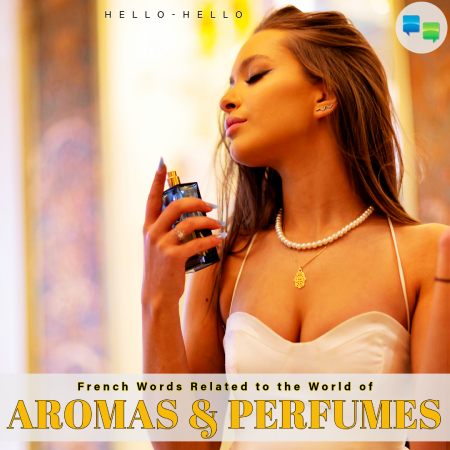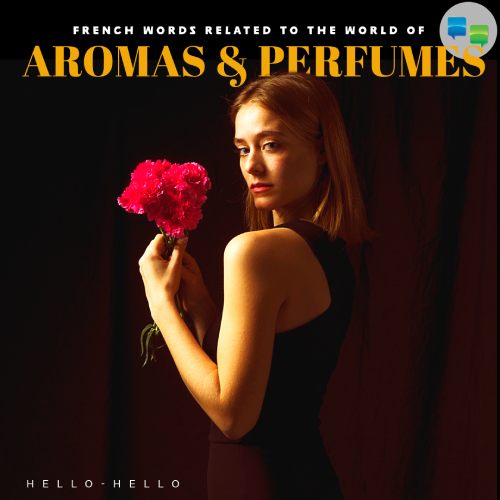Perfumes have captivated humanity since 3000 BCE, with ancient Egyptians using fragrances like jasmine and myrrh for spiritual rituals. The Greeks and Romans advanced perfume making, the latter coining “per fumum” (through smoke). In the Middle Ages, perfumes were replaced by pomanders to mask unpleasant odors.
In the late 14th century, Queen Elizabeth of Hungary revived perfumery with the creation of alcohol-based Queen of Hungary Water. By 1656, France became the perfume epicentre with the Corporation of Glovemakers and Perfumers. King Louis XIV, who rarely bathed, popularized perfumes, leading to the rise of cities like Grasse as perfume hubs.
Today, Grasse is still known as the world’s perfume capital, and much of our perfume terminology is French in origin. Let us know more about French words related to the world of aromas and luxury perfumes from Hello-Hello Language on Go the leading French language learning app developer for iOS and Android devices.
Eau De…
French terms like eau fraîche, eau de cologne, eau de toilette, eau de parfum, and parfum differ in their concentrations of perfume oils. Higher oil concentration means less alcohol and longer-lasting fragrance.
Eau fraîche is the lightest, with 1-3% perfume oil.
Eau de cologne has 2-5% perfume oil, features floral, fruity, or citrus notes, and lasts up to two hours, making it cheaper. Eau de toilette, with 5-15% oil, lasts 3-4 hours and is ideal for daily wear. Eau de parfum, at 15-20% oil, lasts up to five hours and is popular for evening use. Parfum has the highest concentration, 20-40%, and lasts up to eight hours, making it the most expensive.
Enhancing Your Mental Health with Aromatherapy
In the 1930s, French chemist Rene-Maurice Gattefossé coined “aromatherapy” after curing a burn with lavender oil. His work led to the creation of the French Society of Aromatic Products. Today, aromatherapy is recognized for its benefits to mental health and well-being.
Lavender, bergamot, and chamomile have calming properties that reduce stress and anxiety. Lavender-scented products are particularly helpful for improving sleep, as lavender can lower blood pressure and heart rate.
Citron, menthe, romarin (Lemon, peppermint, and rosemary) have stimulating properties that can instantly enhance mood and improve focus and concentration.
Menthe, eucalyptus, pamplemousse (Peppermint, eucalyptus, and grapefruit): Use this blend to boost energy levels and improve your mood.
Here’s a brief aromatherapy routine: Start your day with an invigorating shower using menthol or calming scents like rose, jasmine, or vanilla shower steamers. Carry a de-stress rollerball for quick aromatherapy breaks with frankincense, chamomile, and rosemary, and consider using diffuser necklaces for portable essential oil use. Additionally, use lavender pillow mist for a peaceful night’s sleep.
Accord — A blend of several notes/ingredients that give perfumes their distinctive character.
Capiteux (“heady”) — A scent that deeply affects the senses.
Notes — In perfumery, you have notes de tête (top notes), notes de cœur (middle or heart notes), and notes de fond (base notes). Notes de tête are perceived immediately upon application and evaporate within 5 to 15 minutes. Notes de cœur form the main body of the perfume and can evaporate within 20 to 60 minutes, while notes de fond can still be perceived after many hours.
Enfleurage — A traditional perfumery method using odorless fat to capture the fragrance of fresh flowers, first employed in 16th-century Grasse.
Extrait (“extract”) — Concentrated materials derived from plants, flowers, or fruits.
Huile essentielle ou essence (“essential oil or essence”) — Oils extracted from plants or fruit through distillation or cold pressing.
Ligne (“line”) — A fragrance line comprising products derived from the same perfume. Note that a flanker is a newly produced perfume sharing attributes with an existing one.
Pommade (“pomade”) — Highly fragrant fat, a product of the enfleurage process used to extract scents from delicate flowers like rose, jasmine, or mimosa.
Palette — A list of ingredients/raw materials (matières premières) available for creating a new perfume.
Sillage — The scent trail left by a perfume when worn on the skin, from the French word for “wake,” as in ship wake.
Soliflore — A single floral aroma; a perfume centered around the scent of a particular flower.
Touche ou mouillette (“smelling strip or blotter strip”) — An absorbent paper strip allowing testing and evaluation of perfumes.

Learn French (Hello-Hello)
Learn French (Hello-Hello) is a full-fledged language course with 30 LESSONS developed in collaboration with the American Council on the Teaching of Foreign Languages (ACTFL), so you can be assured that these lessons follow an effective research-based methodology. All lessons are conversational based on realistic dialogues and situations, rather than a collection of out-of-context words and phrases. iTunes store link of Learn French (Hello-Hello)


